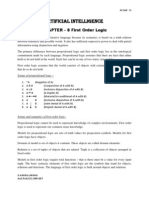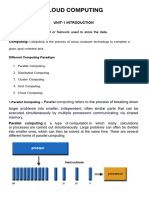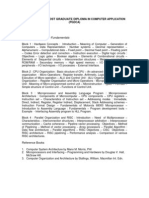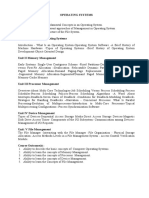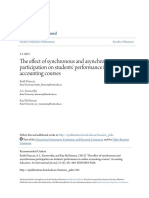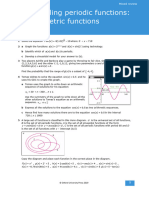Advanced Concepts in Operating Systems
Uploaded by
Satyajit YadavAdvanced Concepts in Operating Systems
Uploaded by
Satyajit YadavAdvanced Concepts in Operating Systems CS603: Credit: 3 Objectives To study the characteristics of OS for Multiprocessor and Multicomputer.
To learn the issues related to designing OS. To learn the latest trends in building Mobile OS. UNIT I Multiprocessor Operating Systems: System Architectures- Structures of OS OS design issues Process synchronization Process Scheduling and Allocationmemory management. UNIT II Distributed Operating Systems: System Architectures- Design issues Communication models clock synchronization mutual exclusion election algorithms- Distributed Deadlock detection UNIT III Distributed scheduling - Distributed shared memory - Distributed File system Multimedia file systems - File placement - Caching UNIT IV Database Operating Systems: Requirements of Database OS Transaction process model Synchronization primitives - Concurrency control algorithms UNIT V Mobile Operating Systems: ARM and Intel architectures - Power Management Mobile OS Architectures - Underlying OS - Kernel structure and native level programming Runtime issues- Approaches to power management Outcome Knowledge about advanced concepts in OS Ability to develop OS for distributed systems
Ability to develop modules for mobile devices TEXT BOOK: 1. M Singhal and NG Shivaratri , Advanced Concepts in Operating Systems, Tata McGraw Hill Inc, 2001 REFERENCE BOOK 1. A S Tanenbaum, Distributed Operating Systems, Pearson Education Asia, 2001 2. Source Wikipedia, Mobile Operating Systems, General Books LLC, 2010
You might also like
- Operating System 2 Marks and 16 Marks - Answers75% (4)Operating System 2 Marks and 16 Marks - Answers45 pages
- Artificial Intelligence Unit-4 First Order Logic100% (2)Artificial Intelligence Unit-4 First Order Logic11 pages
- Distibuted Database Management System NotesNo ratings yetDistibuted Database Management System Notes58 pages
- Web - Technology (Questions & Answers For Lab Viva)67% (3)Web - Technology (Questions & Answers For Lab Viva)18 pages
- Computer Architecture & Organization Unit 4100% (2)Computer Architecture & Organization Unit 424 pages
- 1.symmetric and Distributed Shared Memory Architectures79% (19)1.symmetric and Distributed Shared Memory Architectures29 pages
- Unit-1 Problem Areas in A Distributed DDBMS100% (3)Unit-1 Problem Areas in A Distributed DDBMS8 pages
- Chapter 6: Query Decomposition and Data Localization0% (1)Chapter 6: Query Decomposition and Data Localization26 pages
- Unit-1 (Cloud Computing) 1. (Accessible) Scalable Computing Over The Internet100% (1)Unit-1 (Cloud Computing) 1. (Accessible) Scalable Computing Over The Internet17 pages
- Computer Networks Application Layer NotesNo ratings yetComputer Networks Application Layer Notes23 pages
- Artificial Intelligence (AI) Part - 2, Lecture - 12: Unification in First-Order Logic0% (1)Artificial Intelligence (AI) Part - 2, Lecture - 12: Unification in First-Order Logic18 pages
- 5 - Memory Management: (5) What Is Paging? Explain The Conversion of Virtual Address in Paging With Example100% (2)5 - Memory Management: (5) What Is Paging? Explain The Conversion of Virtual Address in Paging With Example3 pages
- Presentation On Memory Organization in Computer ArchitectureNo ratings yetPresentation On Memory Organization in Computer Architecture15 pages
- Distributed Operating Systems Concepts and Design PDF0% (1)Distributed Operating Systems Concepts and Design PDF1 page
- Localization and Calling: Mobile Station International ISDN Number (MSISDN) : The Only Important NumberNo ratings yetLocalization and Calling: Mobile Station International ISDN Number (MSISDN) : The Only Important Number3 pages
- Inclusion, Coherence and Locality Properties100% (1)Inclusion, Coherence and Locality Properties13 pages
- Unit 1 Introduction of Machine Learning NotesNo ratings yetUnit 1 Introduction of Machine Learning Notes57 pages
- Counting Ones in A Window: The Cost of Exact Counts100% (1)Counting Ones in A Window: The Cost of Exact Counts13 pages
- Components of An Image Processing SystemNo ratings yetComponents of An Image Processing System3 pages
- Operating System Kcs-401. Question Bank À Unit-Iv: Memory Management100% (1)Operating System Kcs-401. Question Bank À Unit-Iv: Memory Management2 pages
- Database Architecture For Parallel ProcessingNo ratings yetDatabase Architecture For Parallel Processing10 pages
- Relational Database Management System: Self Learning MaterialNo ratings yetRelational Database Management System: Self Learning Material213 pages
- Chapter 7 Common Standard in Cloud Computing: Working GroupNo ratings yetChapter 7 Common Standard in Cloud Computing: Working Group6 pages
- Operating Systems: Credits: 4 Credits Course Coordinator: V.V.SubrahmanyamNo ratings yetOperating Systems: Credits: 4 Credits Course Coordinator: V.V.Subrahmanyam4 pages
- Operating Systems: Concepts to Save Money, Time, and FrustrationFrom EverandOperating Systems: Concepts to Save Money, Time, and FrustrationNo ratings yet
- 01-Central de Deteção-Honeywell-Galaxy Dimension 96-Manual de Utilizador - enNo ratings yet01-Central de Deteção-Honeywell-Galaxy Dimension 96-Manual de Utilizador - en48 pages
- The Effect of Synchronous and Asynchronous Participation On Students' Performance in Online Accounting CoursesNo ratings yetThe Effect of Synchronous and Asynchronous Participation On Students' Performance in Online Accounting Courses31 pages
- Analisis Tingkat Kesehatan Bank Dengan Menggunakan Metode Risk Profile, Good Corporate Governance, Earning, Capital (RGEC)No ratings yetAnalisis Tingkat Kesehatan Bank Dengan Menggunakan Metode Risk Profile, Good Corporate Governance, Earning, Capital (RGEC)16 pages
- Computer Technologies Used in An OrganizationNo ratings yetComputer Technologies Used in An Organization7 pages
- Technical Analysis: DR - Manish Dadhich Mba, Net, SetNo ratings yetTechnical Analysis: DR - Manish Dadhich Mba, Net, Set51 pages
- Free Access to Test Bank for Guide to Firewalls and VPNs, 3rd Edition Chapter Answers100% (6)Free Access to Test Bank for Guide to Firewalls and VPNs, 3rd Edition Chapter Answers30 pages
- Systems Analysis and Design in a Changing World 7th Edition Satzinger Solutions Manual - Free Download Available To Read All Chapters100% (1)Systems Analysis and Design in a Changing World 7th Edition Satzinger Solutions Manual - Free Download Available To Read All Chapters24 pages




